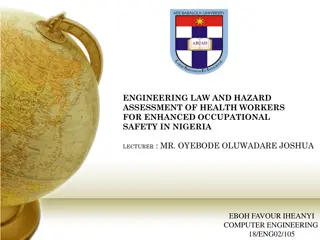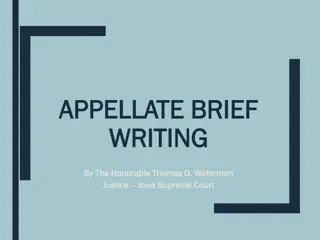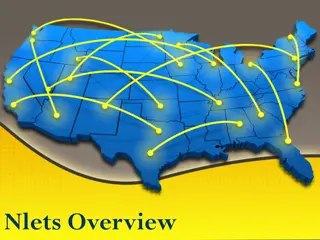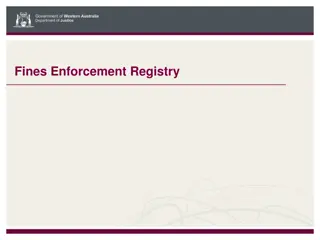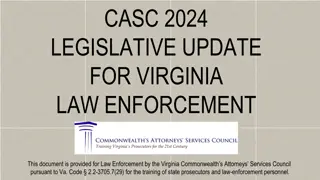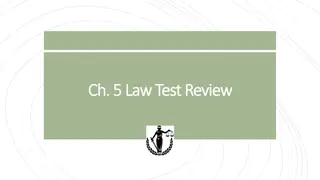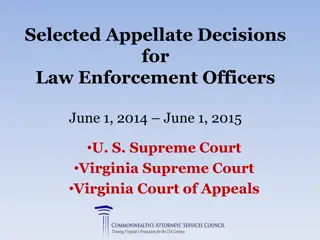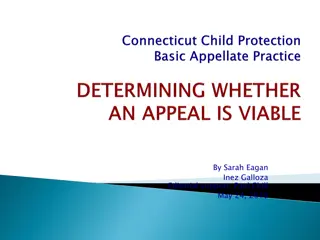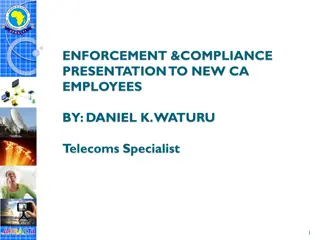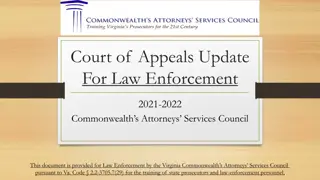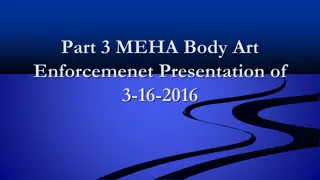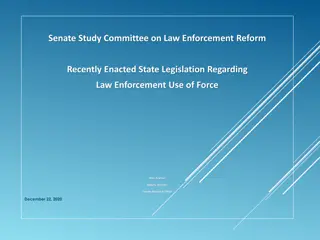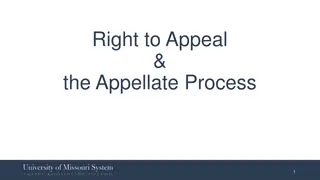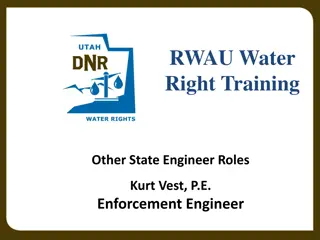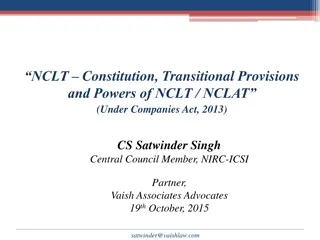Appellate Update for Law Enforcement 2023-2024 Summary
The document prepared by the Virginia Commonwealth's Attorneys Services Council provides an overview of the 2023-2024 Appellate Update for Law Enforcement, covering topics such as criminal procedure, constitutional law, Virginia procedure, bail guidelines, domestic relations court jurisdiction, Fourth Amendment search and seizure, consent in search procedures, and more. It includes case summaries and key legal insights relevant to state prosecutors and law enforcement personnel.
Download Presentation

Please find below an Image/Link to download the presentation.
The content on the website is provided AS IS for your information and personal use only. It may not be sold, licensed, or shared on other websites without obtaining consent from the author.If you encounter any issues during the download, it is possible that the publisher has removed the file from their server.
You are allowed to download the files provided on this website for personal or commercial use, subject to the condition that they are used lawfully. All files are the property of their respective owners.
The content on the website is provided AS IS for your information and personal use only. It may not be sold, licensed, or shared on other websites without obtaining consent from the author.
E N D
Presentation Transcript
Appellate Update for Law Enforcement 2023 - 2024 Commonwealth s Attorneys Services Council This document was prepared by the Virginia Commonwealth s Attorneys Services Council pursuant to Va. Code 2.2-3705.7(29) for the training of state prosecutors and law enforcement personnel.
This Presentation is Only an OVERVIEW For a complete summary of all cases, including the facts and holdings, please see the full 2023-2024 Appellate Update Case List by CASC. (750 pages) The case list has cases broken down by topic and court, with citations when available at time of print. (Note to instructors: The notes field in PowerPoint has additional information accompanying some of these sides.)
PART ONE: Criminal Procedure Constitutional Law and Virginia Procedure
Bail: Martin v. C/w, Sept. 26, 2023 (Unp.) Defendant violated probation on offenses of burglary and larceny by absconding from probation and failing to pay any restitution for 8 years. Defendant s lengthy criminal history went back to 1990s. Defendant had new felony charges and a pending DUI. Defendant had a job and lived in the community for 14 years. Court: Probable cause that defendant s release on bail would constitute an unreasonable risk of harm to the public.
Domestic Relations Court: Jurisdiction Yellock v. C/w, 79 Va. App. 627 (2024): Merely being in relationship that involve[d] touching each other, including touch[ing] each other s hair not sufficient to invoke court s jurisdiction. Hackett v. C/w. December 5, 2023 (Unp.): Abuser cannot immunize himself from criminal liability under 18.2-57.2(B) merely because he maintains two domiciles.
Fourth Amendment Search and Seizure
Consent - Carter v. C/w: 79 Va. App. 329 (2023) OFFICER: Do you [have] any weapons or anything like that on you? DEFENDANT: No, sir. OFFICER: Do you mind if I search you real fast just to make sure? Sir, if that s okay. DEFENDANT: Yeah, [you re] all right. You can search me. I don t have any weapons.
Search As officer reached into defendant s jacket pocket, he asked, Nothing on you is gonna poke, prick, or stab me? Defendant replied, No, sir. Officer searched defendant and found a large quantity of cash and empty plastic baggies, which led him to search the car and find drugs, a gun, etc.
Evidence Suppressed Held: General search of defendant s pockets exceeded the scope of his consent. Court: Reasonable person would understand the defendant s consent to be limited to a search for weapons. Contrast: Lee v. Com., May 7, 2024 (Pub.): Court found that the officers request for the defendant s consent to search the backpack was not limited to just firearms. Instead, the Court concluded that it was objectively reasonable for the officer to infer that the defendant impliedly consented to a search of his backpack.
Reasonable Suspicion and Nervousness: U.S. v. Smart: January 22, 2024: True that most everyone is nervous when interacting with the police. Nervousness can still be a relevant factor to the reasonable suspicion inquiry where: 1. suspect s nervousness is extreme - unusual, beyond the norm, or evasive - and 2. officer articulates specific facts supporting his conclusion that the suspect was extremely nervous.
Reasonable Suspicion and Nervousness U.S. v. Podbielski, 4th Cir., August 1, 2023 Passenger s unusual, nervous behavior did provide some reason for suspicion. sweating profusely on a cold day, hands shaking, . . . and increased agitation when asked routine questions are indicative of exceptional nervousness contributing to reasonable suspicion. However, once we eliminate the facts that are reasonably attributable to innocent travelers, or are improper for consideration, we are left with very little. What remains is Appellant s nervousness after being pulled over while driving on a suspended license and Parton s unzipped pants.
Reasonable Suspicion and DUI: Lundmark v. C/w: August 1, 2023 (Unp.) Officer stopped defendant s vehicle because, despite having a green light, the defendant s car remained stopped, its brake lights illuminated, for several seconds. Court: Officer had reasonable suspicion to stop for 46.2-833(A). Mere possibility that defendant might have had innocent explanation for not moving did not negate reasonable suspicion that defendant had violated law.
Pat-Downs Scope of Lawful Frisks
Dangerous Items: Syringe Thompson v. C/w: November 28, 2023 (Unp.) During disorderly conduct investigation, defendant was walking around scene. Officer could see the top half of the syringe sticking out of defendant s pants pocket and observed that the syringe contained a liquid. Officer saw defendant try to push the syringe down into his pants pocket so as to conceal it, but the syringe came back up again later on.
Court: Pat Down Lawful Syringe is not necessarily an innocent item like a hand-rolled cigarette or a film canister. Officer was permitted to seize dangerous items like the liquid-filled syringe, which could have endangered officers safety and others. Also: Once defendant denied knowledge of syringe that officer removed & denied ownership of his own pants, officer had probable cause defendant was in possession of a controlled substance.
Vehicle Frisks Johnson v. C/w: August 8, 2023 (Unp.) Officer removed defendant from vehicle, then returned to defendant s truck and searched it for weapons, finding defendant s firearm underneath the edge of defendant s seat. Court: Officer had reasonable suspicion to pat down defendant. Search was lawful under Glover v. C/w, 3 Va. App. 152 (1986). Note: 4th Circuit 2022 Buster ruling has contrary language (from which the 4th Circuit itself has been trying to distance itself).
Court: Scope of Pat Down Lawful Court quoted Long s statement that, even though the defendant did not have immediate access to the vehicle at the time of the search, if the suspect is not placed under arrest, he will be permitted to reenter his automobile [once released from detention], and he will then have access to any weapons inside. Because defendant was not under arrest at the time of the search, officer properly searched areas of the vehicle where the defendant could immediately access a weapon upon his return to the vehicle.
Search Warrants Recent Rulings
Cooperation Agreements: U.S. v. Bailey, 74 F.4th 151 (2023) Officer told defendant that if he voluntarily turned over the drugs in his house and cooperated with police, he was going to take it and . . . leave, and everything would still be squared away. Defendant cooperated, but not much. Police obtained warrants based on the drugs from his house and arrested him. Officers found more drugs incident to arrest.
Court Must Determine Whether Gvt Breached Agreement and Potential Remedy, If Any When an individual fulfills his obligations under an agreement, settled notions of fundamental fairness mayrequire the government to uphold its end of the bargain. Court remanded to district court to determine whether non-arrest promise was made, relied upon, and breached as alleged. If officer did breach such an agreement, court should also determine whether specific performance or other equitable relief is appropriate to remedy that breach.
Electronic Devices & Search Warrants Specific Rulings
U.S. v. Zelaya Veliz, 4th Cir. February 16, 2024 Significant case on social media warrants and electronic search warrants generally. 4th Amendment permits officers, in searching electronically stored information pursuant to a warrant, to seize or copy the entire storage medium and review it later to determine what electronically stored information falls within the scope of the warrant. Court refused to mandate a timeframe in every case but recommended a timeframe for most warrants.
When is a Phone Evidence? U.S. v. Davis: January 25, 2024 (Pub.) Court: Officers lawfully seized defendant s cell phone as an instrumentality of drug trafficking found in plain view. A phone is an everyday object, like a kitchen scale, whose predominate purpose is not criminal. ... a scale found together with evidence (e.g., bank records) of a crime not typically associated with the use of scales (e.g., tax fraud) does not adopt an incriminating character. But a scale found together with small baggies, large quantities of controlled substances, and firearms can adopt an incriminating character. So too can a cell phone. But for a cell phone to be seized in plain view, the additional evidence or indicators of criminality have significant work to do to establish probable cause.
When is a Phone Evidence? C/w v. Hudson: July 18, 2023 (Unp.) Officers search car and find three handguns, marijuana packaged for sale, and six phones, some of which were claimed by car s five occupants. Four phones were in a single bag, but the occupants only claimed three of them. One of the seized phones had a picture of defendant as the lock screen, but defendant never claimed any of the phones, nor was he carrying one when he was arrested. At the motion to suppress, a detective testified that cell phones, in conjunction with other evidence, can sometimes indicate drug distribution.
Court: Trial Court Wrongly Suppressed Evidence Court: officers had probable cause to seize the cell phone as evidence of a crime. A cell phone alone is typically a common, unsuspicious item. But considering the totality of the circumstances here including the guns and marijuana found in the car, the number of phones, and the fact that three phones went unclaimed an officer could reasonably conclude the unclaimed phone at issue was evidence of a crime and seize it.
Exceptions to Warrant Requirement Probable Cause PLUS ___________________ fill in exception to warrant requirement
Probable Cause is Not an Exception: Parady v. C/w, 78 Va. App. 18 (2023) Police stopped the vehicle in which defendant was riding for a traffic violation and arrested the driver on an outstanding warrant. A K9 unit alerted on the vehicle while the defendant was still seated inside. An officer patted the defendant down and asked the defendant to produce the drugs that he suspected she had on her person by taking them out of her pants. Defendant complied, producing a container that appeared to have several drugs.
Arrest Two Months Later Officer decided not to arrest the defendant, as she had tested positive for COVID, and he believed that the jail would not accept her. Instead, he told the defendant that he would send the drugs to the lab and arrest her when the results returned. Results returned two months later and the officer then arrested the defendant. Defendant moved to suppress, but trial court denied motion.
Chimel: 1969 Ruling on Search Incident to Arrest When an officer makes a lawful custodial arrest, he may search the arrestee and the area within his control, his wingspan. Chimel v. California, 395 U.S. 752 (1969). A custodial arrest of a suspect based on probable cause is a reasonable intrusion under the Fourth Amendment and a search incident to the arrest requires no additional justification, such as the probability in a particular arrest situation that weapons or evidence would in fact be found upon the suspect's person. United States v. Robinson, 414 U.S. 218 (1973).
Timing of Search Incident to Arrest If the facts establish probable cause to arrest, law enforcement may conduct a search of the arrestee s person incident to that arrest. See, e.g., Joyce v. Commonwealth, 56 Va. App. 646, 657, 696 S.E.2d 237, 242 (2010). It does not matter that the formal arrest follow[s] quickly on the heels of the search as long as the officer had probable cause to arrest at the time of the search. Rawlings v. Kentucky, 448 U.S. 98, 111 (1980)).
Parady Court: Evidence Suppressed Court: probable cause to arrest does not permits a warrantless search in the absence of any actual arrest. Court then concluded that the record was insufficient to apply any other ground. Court found that the good-faith exception to the exclusionary rule did not apply, despite language in Bunch.
Court: Mere PC is NOT Enough for a Search Court: probable cause that an individual has contraband, without more, meets the standard for obtaining a warrant, not searching without one. An officer may search after or even before an arrest so long as the search is substantially contemporaneous with the arrest and confined to the immediate vicinity of the arrest. Reasons for that exception are officer safety and evidence preservation, and it is reasonable for an arresting officer to search for and seize any evidence on the arrestee s person to prevent its concealment or destruction. Fact of the lawful arrest is what establishes authority to search.
What is Probable Cause? Applying Basic 4th Amendment in 2024
Probable Cause Does NOT Mean More Likely Than Not Probable cause does not require the fine resolution of conflicting evidence that a reasonable-doubt or even a preponderance standard demands. Gerstein v. Pugh, 420 U.S. 103, 121 (1975). A finding of probable cause does not require finding that it is more likely true than false. Slayton v. Commonwealth, 41 Va. App. 101, 106 (2003) (quoting Texas v. Brown, 460 U.S. 730, 742 (1983) (plurality opinion)) PC for a search warrant does not require that the evidence is more likely than not to be found where the search is to take place The magistrate need only conclude that it would be reasonable to seek the evidence in the place indicated in the affidavit. Gwinn v. Com., 16 Va. App. 972 (1993)
Paraphernalia in Plain View Camann v. C/w., 79 Va. App. 427 (2024) Officers spoke with defendant in the parking lot of a convenience store. During that encounter, officer noticed that the defendant was hiding something under his shoe. Defendant was standing in place, noticeably keeping his left shoe planted as he shifted his weight back and forth. Officer could see a piece of aluminum foil sticking out from beneath Defendant s shoe. Officer later testified that, through his training and experience, he knew that aluminum foil is often used with a straw to smoke narcotics.
Discovery Officer told defendant to move his foot. Defendant did so, revealing aluminum foil with burnt residue and a straw. Officers arrested the defendant and searched his person, discovering a white powder in a cellophane wrapper in his wallet and pills in a pill bottle in his pocket. White powder was two controlled substances: Fentanyl and Etizolam
Court Ruling: RAS for Detention, PC to Arrest Although officer did not at first see the straw or the burnt residue, officer could form a reasonable belief that defendant was engaged in criminal, drug-related activity and trying to hide the evidence, thus seizure that happened when the officer said move your foot was properly supported by reasonable suspicion. Finding burnt residue on an improvised device for smoking narcotics created probable cause to believe that defendant was in possession of a controlled substance. Discovery of drug residue on defendant s person or on a narcotics pipe found in defendant s possession provides probable cause to arrest suspect for possession of a controlled substance. See also U.S. v. Runner, 43 F.4th 417 (2022)
Open Container is NOT Probable Cause McEachin v. C/w: July 25, 2023. (Unp.) Officer saw a bottle of liquor on the passenger side floorboard near the center console. Cap was screwed on the bottle, and less than a quarter of the bottle s contents remained. When the officer asked about liquor bottle, defendant stated that he had not been drinking and immediately offered to take a breathalyzer test.
Court: No PC to Search Vehicle. at most, the liquor bottle and odd speech gave officers a strong suspicion that the defendant had been drinking while driving on a public highway, but strong suspicion is not probable cause Because the open container alone was not illegal under Code 18.2-323.1 and there was no evidence McEachin consumed alcohol while driving, the officers did not have probable cause to search the vehicle for contraband or evidence of a crime relating to alcohol consumption, and the search was unlawful.
Open Container IS Probable Cause Durham v. C/w: July 25, 2023. (Unp.) Officer saw an open bottle of alcohol on the floorboard behind the driver s seat. When defendant rolled down the window and provided his identification card, officer could smell the odor of alcoholic beverage coming from inside the vehicle.
Further Observations Officer also noticed a Styrofoam cup in the center console, which was between driver s seat and front passenger s seat. Defendant handed officer the Styrofoam cup when he asked about it. Officer believed the liquid was liquor due to appearance and smell and poured it out. Officer observed another cup in the cupholder on driver s side of the center console which he testified was in plain view. That cup also contained liquor. Officer then searched the vehicle and found defendant s handgun.
Court: Probable Cause Existed for Search With two cups each containing an alcoholic beverage, it would be a fair inference that at least one of the cups belonged to the driver. Given that each alcoholic beverage was in an open cup, fair to infer beverage was there for immediate consumption i.e., defendant was drinking it while driving the vehicle and not saving it for later. Reasonable to believe that vehicle contained further evidence of that offense.
Reconciling the Rulings Conduct proscribed by 18.2-323.1 is drinking while driving, not simply having an open container containing alcohol. The open bottle of liquor in the rear floorboard alone would likely not supply probable cause of drinking while driving, Here, totality of the circumstances and the reasonable inferences that the officers on the scene and judges are permitted to draw from the facts established PC.
What About Marijuana? Normal Rule: When the police lawfully observe what they believe to be a controlled substance in plain view inside a vehicle, they possess probable cause to search the car. E.g. Fox v. Commonwealth, 213 Va. 97, 100 (1972). E.g. Drake v. Commonwealth, March 26, 2024 (Ct. App., Unp.). HOWEVER: Marijuana, since decriminalization and now legalization, is receiving different treatment from the Courts.
Carter v. Com., 79 Va. App. 329 (2023) Officer stopped defendant at night in high drug area for traffic offense. Officer observed marijuana in the defendant s vehicle. Defendant admitted to possession, which was lawful at the time. Defendant exhibited no nervousness and no elusive or furtive behavior. Defendant consented to a search of his person. Officer found a large quantity of cash and empty plastic baggies Officer searched car and found cocaine, heroin, a gun, etc. etc.
Court: Evidence Suppressed Court: Possession of a small quantity of marijuana, coupled with the absence of smoking paraphernalia on one s person, did not give rise to reasonable suspicion or probable cause to believe that one intends to distribute the marijuana. Absence of such paraphernalia on the defendant s person did not support a reasonable inference that he intended to distribute the marijuana rather than use it himself. Smoking paraphernalia is unnecessary for marijuana consumption since, for example, marijuana can serve as an ingredient in baked goods.
Harvel v. Com., March 19, 2024 (Unp.) Officer responded to a call for an unconscious person in a convenience store parking lot and found the defendant. Looking inside the car, the officer noticed what appeared to be a bag of marijuana in the vehicle s open center console. The officer described it as a small amount of marijuana, roughly three or four grams. At the time of the search, 18.2-250.1 provided that possession of marijuana was unlawful unless it was obtained pursuant to a valid prescription and that violation of the section was a civil offense and subject to a civil penalty of no more than $25. Any violation of the section was to be charged by summons.
Search Officer ordered the defendant out of the vehicle and searched the vehicle. The officer later explained that based on the presence of the marijuana and the fact that the defendant was passed out in the driver s side of the vehicle, he thought there might be more marijuana, paraphernalia, or something other than marijuana in the vehicle. Searching the vehicle, the officer found a bag containing Fentanyl. The defendant moved to suppress, but the trial court denied the motion.
Court: Evidence Suppressed Court: officer acted lawfully in seizing the marijuana which was in plain view and immediately apparent as unlawful to possess saw marijuana, which was at the time still illegal contraband, inside the vehicle. However, the Court complained that beyond the defendant s possession of the small amount of marijuana, the record provided no indication, prior to the further search of the vehicle, that it contained additional contraband or evidence of any crime.
No Evidence of Intoxication The Court lamented that the officer did not provide any basis for his reasoning that there would be contraband or evidence of a crime elsewhere in the vehicle and offered no testimony to support a reasonable belief that the defendant was intoxicated with drugs. Additionally, the Court cautioned that the fact that the defendant was asleep in his vehicle, without more, did not support a reasonable conclusion that he was engaged in criminal activity.

 undefined
undefined





